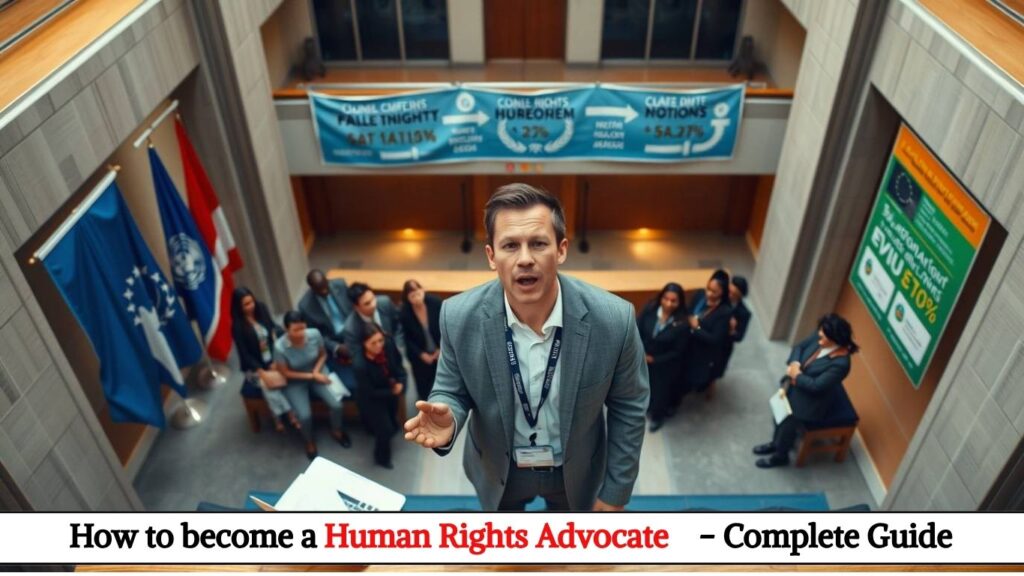
Introduction: Champions of Human Dignity
In a world where 4 billion people live outside legal protection and 150+ countries still practice torture, human rights advocates serve as the moral compass of global society. These passionate professionals fight against injustice, protect vulnerable populations, and shape policies that uphold fundamental freedoms. Whether defending political prisoners, advocating for gender equality, or exposing war crimes, their work changes lives daily.
This comprehensive guide explores:
- The evolution of human rights movements
- Key responsibilities in advocacy work
- Global salary expectations
- Essential qualifications and skills
- Step-by-step career pathways
- Emerging frontiers in rights protection
History of Human Rights Advocacy
Ancient Foundations (Pre-18th Century)
- 1750 BC: Code of Hammurabi establishes early legal protections
- 1215: Magna Carta introduces rule of law concepts
- 1648: Peace of Westphalia recognizes basic humanitarian principles
The Enlightenment Era (1700s-1800s)
- 1789: French Declaration of the Rights of Man
- 1807: Britain abolishes slave trade (Wilberforce’s campaign)
- 1864: First Geneva Convention establishes wartime protections
Modern Human Rights Framework (1900s)
- 1945: UN Charter includes human rights provisions
- 1948: Universal Declaration of Human Rights adopted
- 1961: Amnesty International founded
- 1977: International Criminal Court concept emerges
Digital Age Advocacy (2000s-Present)
- 2002: ICC becomes operational
- 2011: Social media fuels Arab Spring movements
- 2020s: Digital rights become new battleground (VPN bans, internet shutdowns)
- 2023: AI ethics enter human rights discourse
Roles & Responsibilities of Human Rights Advocates
1. Legal Protection & Litigation
- Represent victims in:
- International courts (ICC, ICJ)
- Regional systems (ECtHR, IACHR)
- Domestic constitutional courts
2. Policy Advocacy & Lobbying
- Draft model legislation
- Campaign for treaty ratifications
- Advise parliamentary committees
3. Crisis Response & Documentation
- Conduct war crime investigations
- Document torture evidence (Istanbul Protocol)
- Manage refugee rights cases
4. Public Awareness Campaigns
- Organize protests and petitions
- Run social media advocacy (#MeToo, #BlackLivesMatter)
- Produce documentary evidence
5. Capacity Building
- Train local activists
- Establish community monitoring systems
- Develop early warning mechanisms
6. Corporate Accountability
- Enforce UN Guiding Principles on Business
- Challenge tech companies on privacy rights
- Monitor extractive industries
Human Rights Advocate Salary Benchmarks (2024)
United Nations System
| Position | Salary Range |
|---|---|
| UN Human Rights Officer (P-2) | $50,000 – $70,000 |
| Senior Advisor (P-5) | $120,000 – $150,000 |
| Special Rapporteur | $180,000+ |
Non-Governmental Organizations
| Organization Level | Annual Salary |
|---|---|
| Entry-Level (Small NGO) | $35,000 – $45,000 |
| Program Director (Amnesty) | $75,000 – $110,000 |
| Executive Director | $130,000 – $250,000 |
Government & Academia
- US State Dept. Human Rights Officer: $90,000 – $140,000
- UK Foreign Office Advisor: £60,000 – £90,000
- Law Professor (Human Rights): $80,000 – $180,000
Private Sector (ESG Roles)
- Corporate Human Rights Manager: $110,000 – $200,000
- Tech Company Privacy Advocate: $150,000+
Essential Qualifications & Skills
Academic Pathways
- Undergraduate Degrees:
- International Relations
- Law (LLB)
- Political Science
- Social Anthropology
- Postgraduate Specializations:
- LLM in Human Rights (LSE, Columbia)
- MA in Humanitarian Action (Geneva HEI)
- JD with International Law focus
Critical Certifications
| Certification | Focus Area | Issuer |
|---|---|---|
| CHRA | Certified Human Rights Analyst | HREA |
| PHAP | Humanitarian Certification | PHAP |
| ICRC | International Humanitarian Law | ICRC |
Must-Have Skills
- Multilingualism (French/Arabic/Spanish preferred)
- Investigative Documentation (OSINT tools)
- Legal Drafting (UN complaint procedures)
- Crisis Negotiation
- Digital Security (Secure communications)
How to Become a Human Rights Advocate: 5-Step Roadmap
Step 1: Build Foundational Knowledge
- Take online courses (Coursera’s “International Human Rights Law”)
- Volunteer with local rights organizations
- Attend UN Youth Assemblies
Step 2: Gain Field Experience
- Start in roles like:
- Legal Intern (ACLU, Liberty)
- Research Assistant (HRW)
- Field Monitor (ICRC)
Step 3: Develop Specialization
- Choose focus areas:
- Refugee Rights
- Transitional Justice
- Digital Freedoms
- Indigenous Rights
Step 4: Build Professional Network
- Join associations (ILA, IBA Human Rights Committee)
- Attend conferences (Geneva Summit)
- Complete UN volunteer programs
Step 5: Advance to Leadership
- Pursue roles like:
- UN Special Procedures
- Litigation Director (ECHR)
- Policy Advisor (EU Parliament)
Future Scope: Emerging Frontiers in Rights Advocacy
1. Technology & Digital Rights
- Battling internet shutdowns
- Regulating surveillance tech exports
- AI bias and algorithmic justice
2. Climate Justice
- Litigating “climate genocide” cases
- Protecting environmental defenders
- Developing ecocide laws
3. Neuro-Rights
- Cognitive liberty protections
- Brain data privacy laws
- AI-brain interface regulations
4. Pandemic Governance
- Vaccine equity advocacy
- Public health vs. civil liberties
- WHO pandemic treaty negotiations
5. Corporate Accountability
- Enforcing mandatory human rights due diligence
- Challenging strategic lawsuits against public participation (SLAPPs)
- Monitoring crypto industry impacts
Conclusion: Your Call to Action
Human rights advocacy remains one of the most challenging yet rewarding careers – where success is measured in lives protected rather than profits earned. With global freedom declining for 17 consecutive years (Freedom House 2023), the world needs skilled advocates more than ever.
Begin your journey today by:
- Specializing in emerging rights areas
- Volunteering with frontline organizations
- Mastering UN complaint mechanisms
- Building crisis response skills
As Eleanor Roosevelt famously guided the UDHR drafting: “Where, after all, do universal human rights begin? In small places, close to home.” Your advocacy journey starts right where you stand.













Post Comment